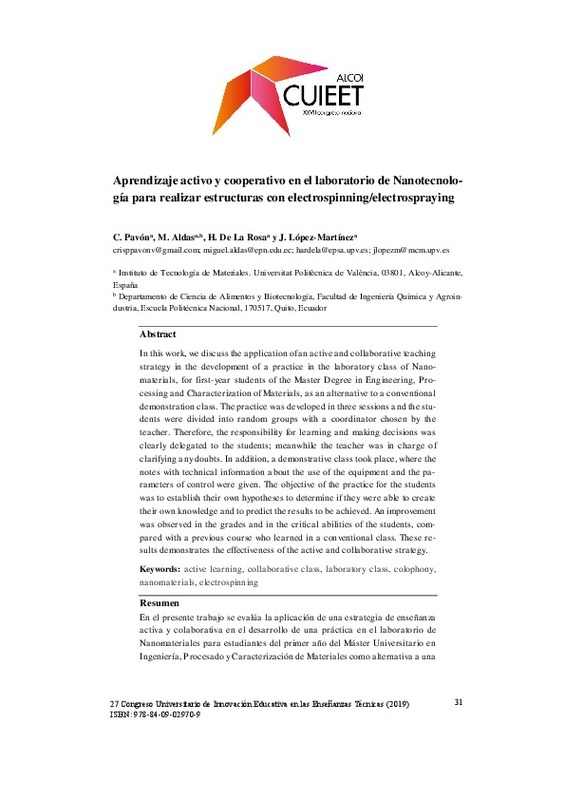JavaScript is disabled for your browser. Some features of this site may not work without it.
Buscar en RiuNet
Listar
Mi cuenta
Estadísticas
Ayuda RiuNet
Admin. UPV
Aprendizaje activo y cooperativo en el laboratorio de Nanotecnología para realizar estructuras con electrospinning/electrospraying
Mostrar el registro completo del ítem
Pavón-Vargas, CP.; Aldas-Carrasco, MF.; Rosa-Ramírez, HDL.; López-Martínez, J. (2019). Aprendizaje activo y cooperativo en el laboratorio de Nanotecnología para realizar estructuras con electrospinning/electrospraying. Universitat Politècnica de València. 31-38. http://hdl.handle.net/10251/179343
Por favor, use este identificador para citar o enlazar este ítem: http://hdl.handle.net/10251/179343
Ficheros en el ítem
Metadatos del ítem
| Título: | Aprendizaje activo y cooperativo en el laboratorio de Nanotecnología para realizar estructuras con electrospinning/electrospraying | |
| Autor: | ||
| Entidad UPV: |
|
|
| Fecha difusión: |
|
|
| Resumen: |
[EN] In this work, we discuss the application of an active and collaborative teaching
strategy in the development of a practice in the laboratory class of Nanomaterials, for first-year students of the Master Degree in ...[+]
[ES] En el presente trabajo se evalúa la aplicación de una estrategia de enseñanza activa y colaborativa en el desarrollo de una práctica en el laboratorio de Nanomateriales para estudiantes del primer año del Máster ...[+]
|
|
| Palabras clave: |
|
|
| Derechos de uso: | Reconocimiento - No comercial - Sin obra derivada (by-nc-nd) | |
| ISBN: |
|
|
| Fuente: |
|
|
| Editorial: |
|
|
| Versión del editor: | https://www.27cuieet.es/ | |
| Título del congreso: |
|
|
| Lugar del congreso: |
|
|
| Fecha congreso: |
|
|
| Tipo: |
|







